ARTICLE AD BOX
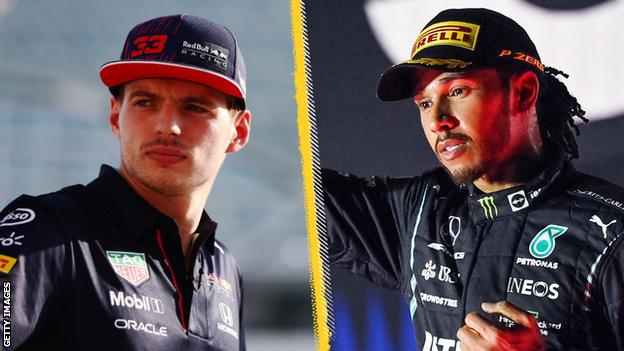 The Abu Dhabi Grand Prix is live on 5 Live and the BBC Sport website at 13:00 GMT on Sunday
The Abu Dhabi Grand Prix is live on 5 Live and the BBC Sport website at 13:00 GMT on SundayMax Verstappen and Lewis Hamilton face off for the 2021 Formula 1 World Championship in Abu Dhabi this weekend in what is arguably the most intense title decider in the sport's history.
And if it's not the most intense - Ayrton Senna v Alain Prost in 1989 and 1990, which both ended in collisions between the participants, are pretty tough competition - it's certainly right up there.
It is the first time two drivers have gone into the last race of the season tied on points since 1974. It is the first final-race showdown between two drivers from different teams since 2012. And it comes at the end of a season characterised by bitterness and rancour between two teams and drivers pushing to the very limit - and sometimes beyond.
Verstappen and Hamilton have collided on track three times, and raced ultra-hard at many of the grands prix this season.
- How to follow F1 finale on BBC radio and online
- I'm treated differently to other drivers - Verstappen
- 'A Verstappen can't lose' - the making of an F1 phenomenon
- Verstappen a shining light close to David v Goliath upset - Horner
Yet for most of the year any unpleasantness had more or less been limited to a war of words, and behind-the-scenes shenanigans over the rules, between the bosses of the two teams in question, Mercedes' Toto Wolff and Red Bull's Christian Horner.
But in Saudi Arabia last weekend the tense battle between Hamilton and Verstappen finally erupted in a race of quite extraordinary controversy and incident.
During it, Hamilton called Verstappen "crazy". After it, he said the Dutchman drove as if the rules did not apply to him.
Verstappen was penalised twice - once for gaining an advantage by going off the track; and once for dangerous driving, when he was found to have braked hard with Hamilton right behind him, leading to a collision between the two cars.
Through all that, Hamilton came from behind to pass Verstappen and win for the second time in three races, taking his third victory in a row. He has closed what had been a 19-point deficit after Verstappen's victory in Mexico last month to nothing. And now the title awaits one of them in a winner-takes-all showdown.
The title maths - and jeopardy
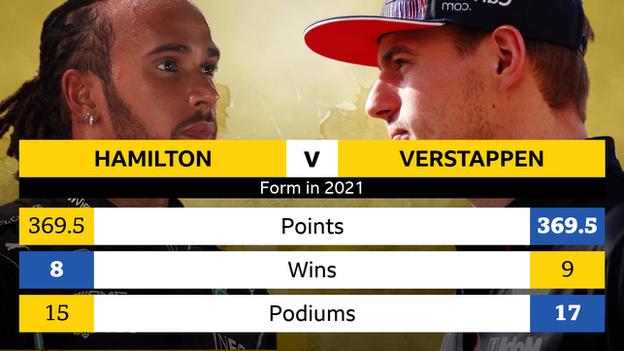 Lewis Hamilton v Max Verstappen: The tale of the tape
Lewis Hamilton v Max Verstappen: The tale of the tapeVerstappen and Hamilton are tied on points. If both drivers finish the race, whoever takes the chequered flag first will be world champion.
If it's Hamilton, it will be his eighth drivers' title, a new record, moving him one clear of Michael Schumacher, with whom he is currently tied. If it's Verstappen, it means the end of seven years of Mercedes domination.
But it is not quite as straightforward as that.
Although they are level on points, Verstappen is still classified as the championship leader because he has nine wins to Hamilton's eight. That means that if they come together and neither finishes the race, Verstappen will be champion.
The idea of a collision potentially deciding this championship has been a very real talking point in F1 for some time now, especially given the ruthlessness with which Verstappen has been driving.
In essence, he will never give way, even when other drivers would accept the corner was lost. If he is racing with someone, if he's on the outside, he will turn in on them; if he's on the inside, he will push them wide.
His belief is that if both drivers go off the track in the course of an overtaking move, that is no cause for a penalty. The stewards in Jeddah disagreed and put the blame on Verstappen for creating a situation where that happened. Many of the drivers believe the same decision should have been made in the similar situation at the Sao Paulo Grand Prix two races before, which was not penalised.
And now extra jeopardy has been added by the incident in Jeddah in which Hamilton ran into the back of Verstappen after the Red Bull driver was adjudged to have braked with 69 bar of pressure, causing a deceleration force of 2.4g, about half what an F1 car can achieve at maximum braking capability, when the Mercedes was right behind him.
Hamilton called this "a brake test" - an accusation drivers level at each other when they think the car in front has deliberately tried to cause a collision, or at the very least give them a fright. Verstappen called it a "misunderstanding" and said he was simply trying to let Hamilton through having been ordered to do so by race control after preventing Hamilton passing him by forcing him wide.
- Channel 4 to show Formula 1 season finale
- Hamilton v Verstappen: Key moments in F1's thrilling title battle
- Winning Formula? Hamilton, Verstappen and the Netflix resurgence
Echoes of history
The question on many lips is: what approach will Verstappen take in Abu Dhabi?
In Brazil last month, he got away with forcing Hamilton off the track to keep his position.
In Jeddah, he did not, and now he knows he could well be penalised if he does it again - almost certainly would be, in fact.
Beyond that there is the spectre of a collision. In 1994 and 1997, Schumacher infamously collided with his title rival in the final race of the season, into both of which races he headed knowing that he would be champion if neither car finished.
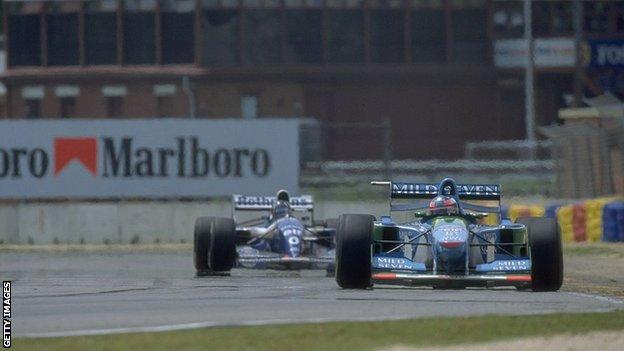 Michael Schumacher and Damon Hill collided at the season-ending Australian Grand Prix in their 1994 title battle
Michael Schumacher and Damon Hill collided at the season-ending Australian Grand Prix in their 1994 title battleIn 1994, in Adelaide, it worked. When he turned in on Damon Hill's Williams, Schumacher's Benetton was out of the race, but so was Hill, with broken front suspension, and the German won his first world title.
In 1997 at Jerez, it did not work. Schumacher turned in on Jacques Villleneuve's Williams and his Ferrari slid out of the race. Villeneuve continued, hobbled but able to finish third, and became champion.
Both incidents have permanently stained Schumacher's reputation.
Verstappen knows this. Indeed, this writer discussed this very thing with him in an interview at the 2019 Japanese Grand Prix.
This is how the conversation went:
"Like [with] overtaking," Verstappen said. "If I have to touch, I'll touch. It's not like it always needs to be in the cleanest way. Let's say it like this - after my career, if I would have won five championships but I'm maybe not the most liked person, for me that doesn't matter, because at the end of the day, it's all about winning.
"And that maybe sounds arrogant, but I don't want to sound like that. I would do anything - or everything - to win. If it's a little bit, not dirty, but in a hard way, I will do it. I am not here to be the most-liked person."
And what's the line between hard and dirty in your head, I asked him?
"Dirty is like deliberately… I would refer to Schumacher turning into Damon and Villeneuve. Those two were I think crossing the line. But a hard fight, having a bit of a touch [is OK] - but of course out-braking, being on the edge. Not the other car is overtaking me, I'll just turn in and we both crash; that's a different mentality."
Red Bull, who last won the title in 2013 with Sebastian Vettel, are desperate to beat Hamilton this weekend. But Horner says how they win also matters.
"We want to win it on the track," he says, "not in the stewards room, not in a gravel trap. It has been a tough fight, all the way through the year. There has been some fantastic racing. I hope it is a fair and clean race in Abu Dhabi."
The difficulty is that Hamilton and Verstappen - and Wolff and Horner, for that matter - have different views of what "fair and clean" is. That's why there is so much jeopardy hanging over this weekend.
- Five F1 documentaries to get you in the mood
- Five of Formula 1's most dramatic final-race title deciders
Gloves off between the teams
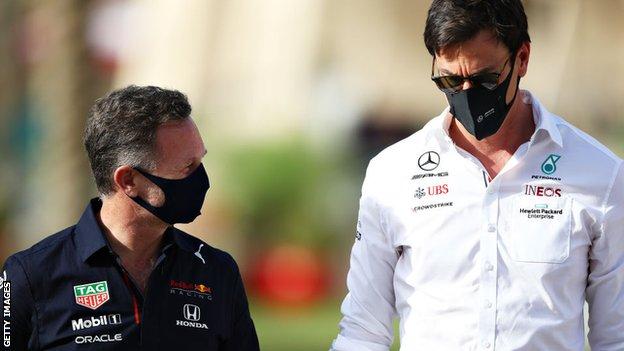 Red Bull's Christian Horner and Mercedes' Toto Wolff have had plenty of verbal sparring throughout 2021
Red Bull's Christian Horner and Mercedes' Toto Wolff have had plenty of verbal sparring throughout 2021There is no love lost between the teams, either.
Wolff and Horner have spent the season sniping at each other - both publicly, in a borderline pantomime-style war of words; and behind the scenes, trying to work the rules to their advantage.
When Mercedes noticed that Red Bull's rear wing was flexing backwards earlier in the season, they complained to governing body the FIA.
This is an age-old trick that teams have used to reduce drag on the straights. The Red Bull wing - and those of several other teams - was flexing on the straights, but it passed all the stiffness tests in the pits.
The tests were then toughened up, and it has been noticeable that after having a small advantage on the straights through the first half of the season, Red Bull have fallen behind Mercedes in this area in the second half of the year.
Red Bull, meanwhile, have been pointing their own fingers of suspicion at Mercedes.
They believed they saw evidence of Mercedes' wing flexing - not in the same way, but with the same effect - at the Sao Paulo Grand Prix, and they made a number of visits to the stewards at Interlagos trying to get them to investigate.
Hamilton's car did then fall foul of a problem with his rear wing in Brazil, albeit a different one, and was thrown out of qualifying. A move that led to one of the drives of his career, when he made up 25 places in one and a third race distances over the sprint qualifying event and the grand prix to win.
Red Bull succeeded in getting a new wing test introduced at the following race in Qatar. It was on a trial basis before next year, with no regulatory value. But the Mercedes wing - exactly the same one as used in Brazil - passed it anyway.
The world champions insist that Red Bull were "seeing ghosts" and that their wing was never flexing. They also remain angry that they were not allowed to change the wing that got Hamilton disqualified in Brazil, on the basis that it failed the check it did because it was damaged, not because of any design issue.
How did they get here?
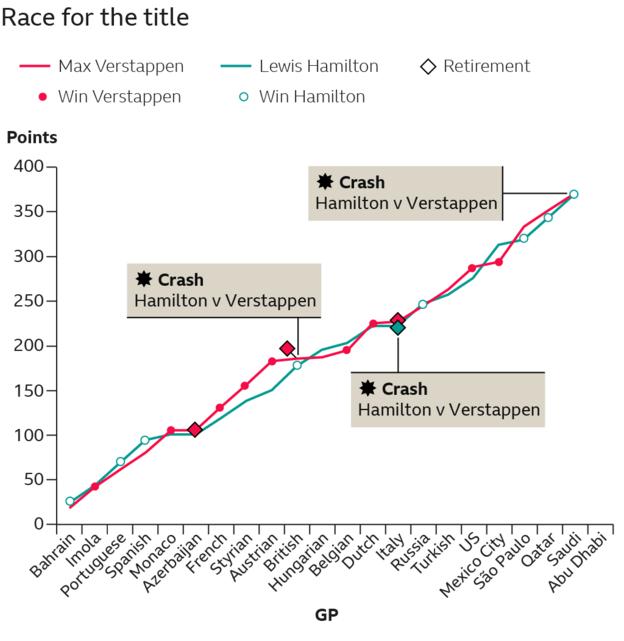
Take a step back for a minute, and it seems incredible that this season can have been so close when the teams are using the same cars as last year, which Hamilton and Mercedes dominated.
That's happened at least partly because of an aerodynamic rule change over last winter that affected their car more than those of most of their rivals.
At the beginning of the season, Mercedes were having all sorts of difficulty with their car. And they were far from sure they would even be able to compete for the title. Indeed, Hamilton has spoken of how demanding it has been getting the car back into a place where it can be competitive.
Red Bull, meanwhile, have quite rightly been talking up the achievement they and engine partner Honda have made in getting onto level terms with Mercedes at last.
The competitive advantage has swung back and forth through the year, but since Mercedes introduced the last big upgrade to their car at the British Grand Prix, there has been a clear trend in their favour, at least in terms of one-lap pace.
And as Mercedes have turned the screw and Hamilton has eroded Verstappen's lead, Red Bull have begun saying how this will have been a good season for them, win or lose on Sunday.
"We're a team that goes for it," Horner said in a news conference after the race in Jeddah on Sunday. "We are going to Abu Dhabi equal on points but leading by virtue of the number of wins.
"At the beginning of the year, if you'd have given us a chance to win the championship at the last race equal on points after 21 races of intense battle with Mercedes, we would all have bitten your arm off. And I think you guys probably would have, too."

- Call of Duty or Battlefield with Bukayo Saka: The England star talks gaming on Press X to Continue
- You're Dead to Me: Who was 'the epitome of the American Renaissance man'?


 2 years ago
34
2 years ago
34
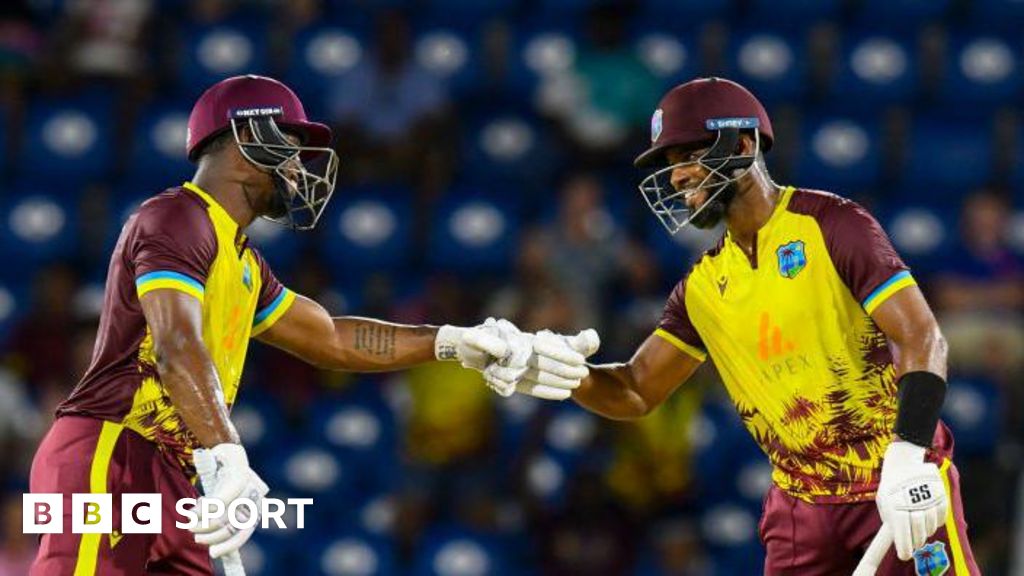
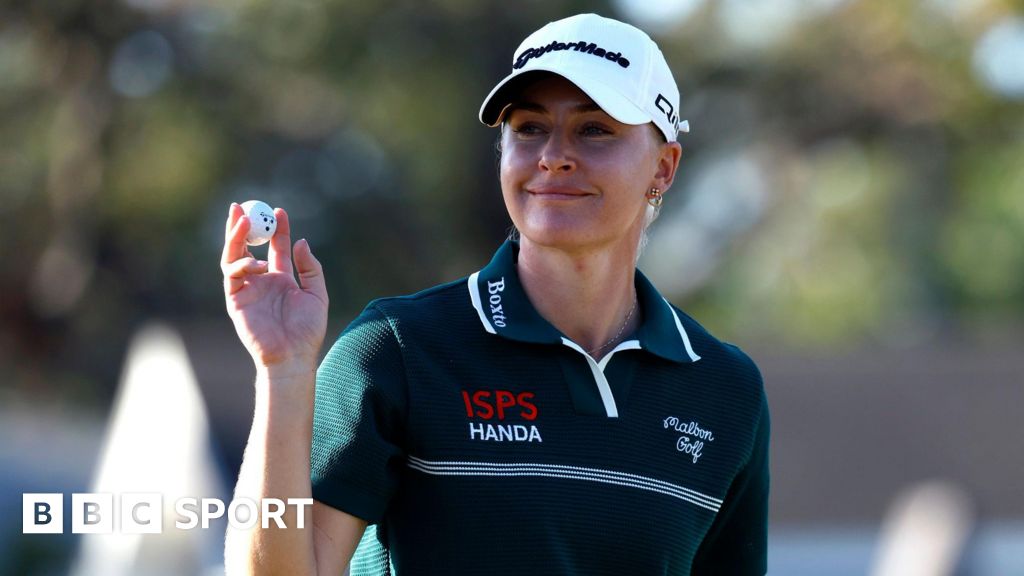
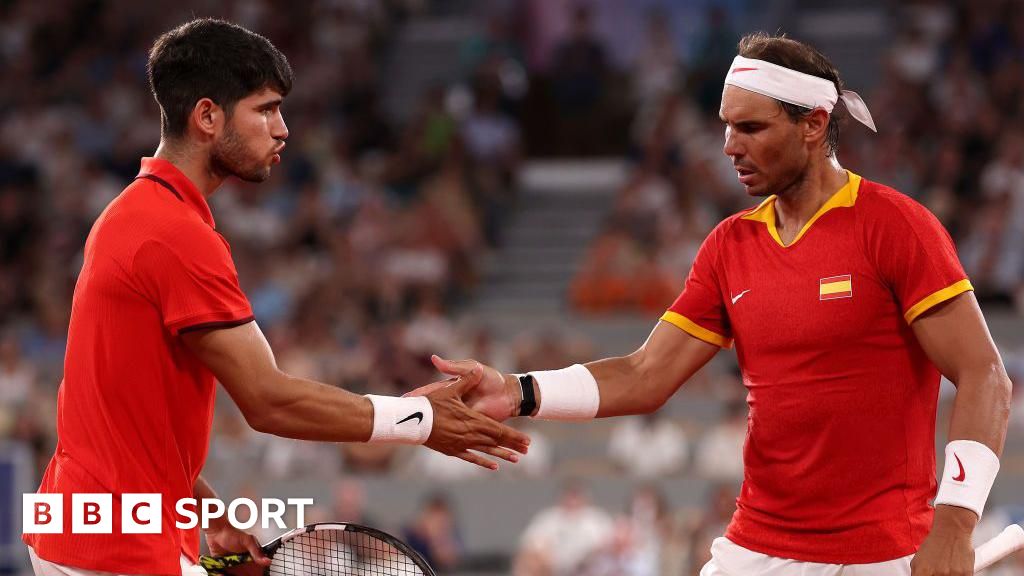





 English (US)
English (US)